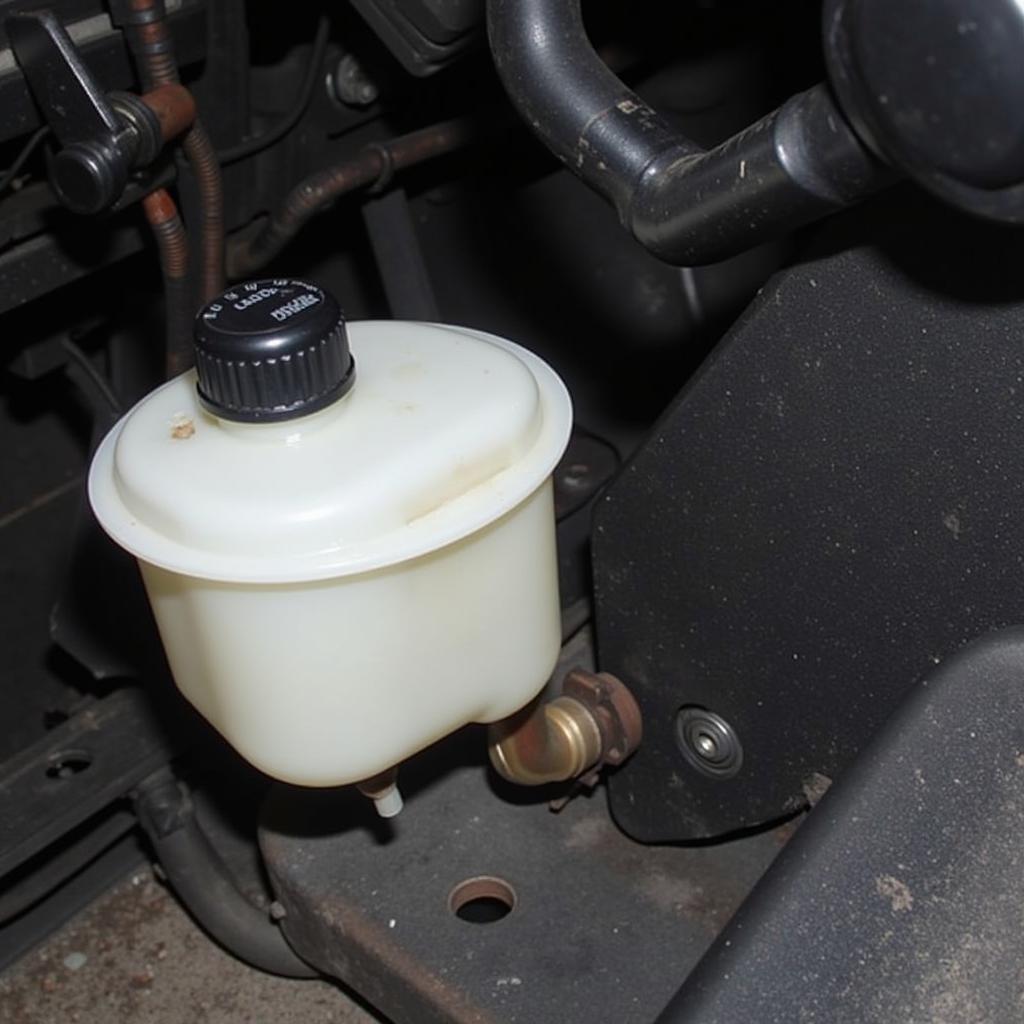If you’re driving your Nissan Titan and the brake warning light pops on, it’s a clear signal that something needs your attention. Ignoring this warning light could compromise your safety and potentially lead to more serious issues down the road. This comprehensive guide will delve into the common reasons behind a glowing brake warning light in your Nissan Titan and offer potential solutions to get you back on track safely.
Understanding Your Nissan Titan’s Brake Warning Light System
Before we jump into the specifics, it’s crucial to grasp how your Nissan Titan’s brake warning light system operates. This system is your vehicle’s way of communicating potential issues within the braking system, ensuring you’re alerted to take action promptly.
The brake warning light is linked to several components, including:
- Parking Brake: The light typically illuminates when the parking brake is engaged. This is a standard feature in most vehicles.
- Brake Fluid Level: Low brake fluid is a serious issue. If the fluid level drops significantly, the warning light will activate to signal a potential leak or worn-out brake pads.
- Brake System Malfunction: Your Titan has a sophisticated electronic brake system. If any component within this system malfunctions, the warning light might trigger.
Common Reasons Your Nissan Titan’s Brake Warning Light is On
Let’s explore some of the most frequent culprits behind that illuminated brake warning light in your Nissan Titan:
1. Engaged Parking Brake
This might seem obvious, but it’s often overlooked. Before panicking, ensure your parking brake is fully released. A partially engaged parking brake can trigger the warning light.
2. Low Brake Fluid
Brake fluid is the lifeblood of your braking system. It transmits the force you apply to the brake pedal to the brake calipers, effectively slowing down or stopping your vehicle.
How to Check Your Brake Fluid:
- Locate the brake fluid reservoir under the hood. Refer to your owner’s manual for the exact location.
- Check the fluid level. Most reservoirs have a “Min” and “Max” marking. Ideally, the fluid should be closer to the “Max” line.
What to do if the Brake Fluid is Low:
- Add brake fluid: If the level is slightly low, you can carefully top it off with the correct brake fluid type recommended in your owner’s manual.
- Inspect for leaks: Low brake fluid often indicates a leak. Carefully examine the area around the master cylinder, brake lines, and near the wheels for any signs of fluid leakage.
3. Worn Brake Pads
Brake pads are designed to wear down over time. As you use your brakes, friction between the pads and rotors generates heat, gradually wearing them away. When the pads become too thin, the brake warning light activates.
Signs of Worn Brake Pads:
- Squealing or grinding noises when applying the brakes
- Vibrations felt through the brake pedal
- Longer stopping distances
What to do if You Suspect Worn Brake Pads:
It’s crucial to have your brake pads inspected by a qualified mechanic if you notice any of these signs. Driving with worn brake pads is dangerous and can damage your rotors, leading to costlier repairs.
4. Faulty Brake Sensors
Modern vehicles like your Nissan Titan are equipped with brake pad wear sensors. These sensors are small metal tabs embedded within the brake pad material. When the pad wears thin, the sensor comes into contact with the rotor, completing a circuit and triggering the brake warning light on your dashboard.
5. ABS Issues
Your Nissan Titan is equipped with an Anti-lock Braking System (ABS), designed to prevent wheel lock-up during hard braking. If your ABS system encounters a problem, the warning light might illuminate.
Common ABS Issues:
- Faulty ABS Wheel Speed Sensor: These sensors monitor the speed of each wheel and relay this information to the ABS control module. A malfunctioning sensor can disrupt the ABS system.
- ABS Module Problems: The ABS module is the brain behind the system. While rare, a faulty module can trigger the warning light.
Diagnosing and repairing ABS problems often require specialized tools and expertise. If you suspect an issue with your ABS system, it’s best to consult a qualified mechanic.
When to Seek Professional Help
While some causes of an illuminated brake warning light might seem straightforward, it’s crucial to remember that your braking system is complex and critical for your safety. If you’re unsure about any aspect of your brake system or encounter persistent issues, seeking professional help is always recommended.
Here are some instances where professional assistance is advisable:
- You’re not comfortable working on your vehicle: Brake systems require precision and expertise. If you’re not confident in your mechanical skills, it’s best to leave the job to professionals.
- You suspect a leak in the brake system: Brake fluid leaks are serious and require immediate attention.
- You experience unusual noises or vibrations during braking: These could indicate more severe problems within the braking system.
- The brake warning light remains on even after addressing basic checks: This suggests a potentially complex issue that requires professional diagnosis.
Conclusion
Addressing a brake warning light in your Nissan Titan should always be a top priority. By understanding the common causes and following the suggested steps, you can ensure your safety and maintain your vehicle’s braking system effectively. Remember, when in doubt, seeking professional help from a qualified mechanic is always the safest course of action.

